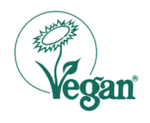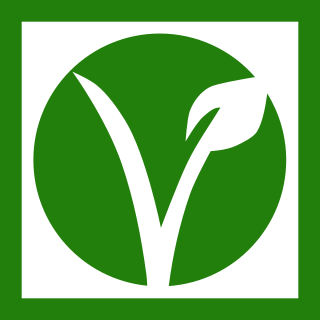
Veganism is the practice of abstaining from the use of animal products—particularly in diet—and an associated philosophy that rejects the commodity status of animals. A person who follows the diet or philosophy is known as a vegan.

Vegetarianism is the practice of abstaining from the consumption of meat. It may also include abstaining from eating all by-products of animal slaughter.
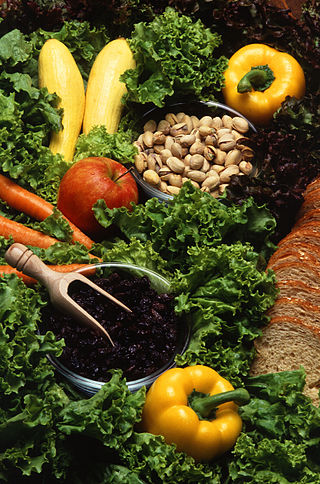
Vegetarian cuisine is based on food that meets vegetarian standards by not including meat and animal tissue products.
Vegan organicagriculture is the organic production of food and other crops with minimal animal inputs. Vegan organic agriculture is the organic form of animal-free agriculture.

A lacto-vegetarian diet is a diet that abstains from the consumption of meat as well as eggs, while still consuming dairy products such as milk, cheese, yogurt, butter, ghee, cream, and kefir.

A flexitarian diet, also called a semi-vegetarian diet, is one that is centered on plant foods with limited or occasional inclusion of meat. For example, a flexitarian might eat meat only some days each week. Flexitarian is a portmanteau of the words flexible and vegetarian, signifying its followers' less strict diet pattern when compared to vegetarian pattern diets.
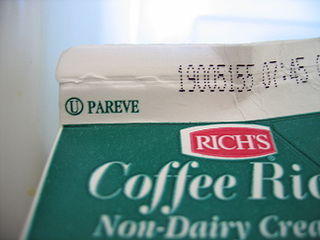
In kashrut, the dietary laws of Judaism, pareve is a classification of edible substances that contain neither dairy nor meat ingredients. Food in this category includes all items that grow from the ground, fish, eggs, and non-biological edible items.

Donald Watson was an English animal rights advocate who co-founded The Vegan Society.

Ovo vegetarianism is a type of vegetarianism which allows for the consumption of eggs but not dairy products, in contrast with lacto vegetarianism. Those who practice ovo vegetarianism are called ovo-vegetarians. "Ovo" comes from the Latin word for egg.

Vegetarian and vegan dietary practices vary among countries. Differences include food standards, laws, and general cultural attitudes toward vegetarian diets.

The earliest records of vegetarianism as a concept and practice amongst a significant number of people are from ancient India, especially among the Hindus and Jains. Later records indicate that small groups within the ancient Greek civilizations in southern Italy and Greece also adopted some dietary habits similar to vegetarianism. In both instances, the diet was closely connected with the idea of nonviolence toward animals, and was promoted by religious groups and philosophers.
Women have played a central role in animal advocacy since the 19th century. The animal advocacy movement – embracing animal rights, animal welfare, and anti-vivisectionism – has been disproportionately initiated and led by women, particularly in the United Kingdom. Women are more likely to support animal rights than men. A 1996 study of adolescents by Linda Pifer suggested that factors that may partially explain this discrepancy include attitudes towards feminism and science, scientific literacy, and the presence of a greater emphasis on "nurturance or compassion" amongst women. Although vegetarianism does not necessarily imply animal advocacy, a 1992 market research study conducted by the Yankelovich research organization concluded that "of the 12.4 million people [in the US] who call themselves vegetarian, 68% are female, while only 32% are male".

Barbara Moore, born Anna Cherkasova, was a Russian-born British engineer who attempted to gain celebrity status in the early 1960s for her long-distance walking and promotion of questionable health fads.

Pescetarianism is a dietary practice based on the consumption of fish and shellfish to the exclusion of land-based meats. The practise incorporates seafood into an otherwise vegetarian diet, and may or may not include other animal products such as eggs and dairy products. Approximately 3% of adults worldwide are pescetarian, according to 2017–2018 research conducted by data and analytics companies.
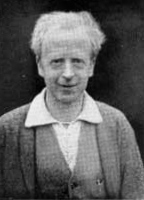
Dugald Patterson McDougall Semple was a Scottish advocate of simple living and animal welfare, naturalist, prolific author, and fruitarian. He is sometimes credited with co-founding the vegan movement in 1944 without using the term "vegan".

Plamil Foods Is a British manufacturer of vegan food products. Founded in 1965, the company has produced and pioneered soy milk, egg-free mayonnaise, pea-based milk, yogurts, confection bars and chocolate.

Vegan cheese is a category of non-dairy, plant-based cheese analogues. Vegan cheeses range from soft fresh cheeses to aged and cultured hard grateable cheeses like plant-based Parmesan. The defining characteristic of vegan cheese is the exclusion of all animal products.
Multiple symbols have been developed to represent lacto-vegetarianism and veganism. Several are used on food packaging, including voluntary labels such as The Vegan Society trademark or the V-Label as well as the vegetarian and non-vegetarian marks mandated by the Indian government. Symbols may also be used by members of the vegetarian and vegan communities to represent their identities, and in the course of animal rights activism.
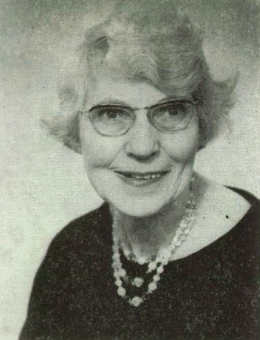
Elsie Beatrice Shrigley, also known as Sally Shrigley, was an English vegan activist and a co-founder, along with Donald Watson, of The Vegan Society in 1944. She is credited, by some, as coining the word "vegan" with Watson.

